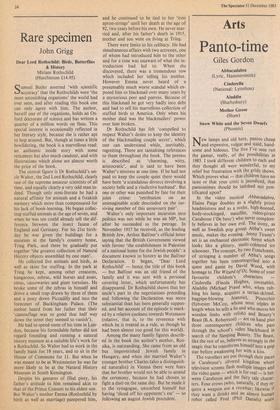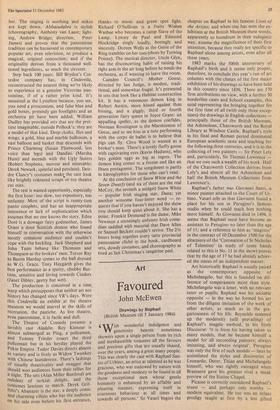Arts
Panto-time
Giles Gordon
New lamps and old here, pantos cheap and expensive, vulgar and staid, hand- some and hideous. The five I've seen run the gamut, really, of the possibilities in 1983. I took different children to each and they thought all were wonderful, to my relief but frustration with the grisly shows. Which proves what — that children have no taste or that your critic is jaundiced, that pantomimes should be imbibed not pon- tificated upon? In the video musical Abbacadabra, Elaine Paige doubles as a slightly prissy headmistress and as a svelte, high-booted, body-stockinged, maudlin, video-pirate Carabosse ('De boss') who never complete- ly believes in her own evil. The irony, as well as Swedish pop group Abba's sweet music, makes the evening. Jenny Tirami's set is an enchanted electronic forest which looks like a glittery, multi-coloured ice schooner. The concept, by two Frenchmen, of stringing a number of Abba's songs together has been transmogrified into a quest and game by David Wood, with homage to The Wizard of Oz. Some of your
favourite children's
characters — Cinderella (Finola Hughes, covetable), Aladdin (Michael Praed who, when rub- bing his lamp, acquires a tartan-skirted, bagpipe-blowing Jeannie),, Pinocchio (Sylvester McCoy, whose nose triples in length when he tells a lie and who
moves his wooden limbs with relish) and Beauty's Beast (B.A. Robertson) — are on hand plus who pass three contemporary children
through the school's video blackboard in Beauty. search of the Sleeping Y. The Beast, like the rest of us, believes so strongly in the magic that he transforms himself into a pop star before awakening her with a kiss.
The travellers are put through their paces in Carabosse's silvered kingdom where television screens flash multiple images and the video game — which is for real — is bet- ween Carabosse and the fairy tale charac- ters. Four crows (who, naturally,
if they re- quire a weapon use a crowbar; likewise if they want a drink) and an almost human robot called Fred (Phil Daniels) assist her. The singing is soothing and mikes are kept down. Abbacadabra is stylish (choreography, Anthony van Laast; light- ing, Andrew 13ridge; direction, Peter James) and proves that the pantomime tradition can be harnessed to contemporary popular art, even television, to produce a magical, original concoction; and if the originality derives from a thousand well- tested ingredients, so much the cleverer.
Step back 100 years. Bill Bryden's Cot- tesloe company has, in Cinderella, reconstructed the nearest thing we're likely to experience to a genuine Victorian pan- tomime, if of a rather prim kind. It's mounted at the Lyttelton because, you see, you need a proscenium, and false blue and gold boxes, pretendy gas footlights and an orchestra pit have been added. William Dudley has provided sets that are the pret- tiest imaginable, outside Pollock's: they are a model of that kind. Drop cloths, flies and wings, a gold, blue and marble ballroom, a vast balloon and basket that descends with Prince Charming (Susan Fleetwood, less voice than legs) and Dandini (Marsha Hunt) and ascends with the Ugly Sisters (Robert Stephens, morose and miserable; Derek Newark, spiteful and petulant). Deir- dre Clancy's costumes make. the cast look like brightly coloured scraps or toy theatre cut outs.
The rest is wasted opportunity, especially the first hour: too slow, too expository, too unfunny. Most of the script is rumty-tum panto couplets, and has an inappropriate innocence or lack of sophistication which assumes that no one knows the story. Edna Dore is a dowager fairy godmother, James Grant a dour Scottish demon who found himself in conversation with the otherwise mostly comatose audience and couldn't cope with the heckling. Jack Shepherd and John Tams behave like Thomson and Thompson as the brokers' men. Trevor Ray as Baron Hardup comes to the ball dressed as W.G. Grace. Tony Haygarth gives the best performance as a spotty, chubby But- tons, sensitive and loving towards Cinders (Janet Dibley, pretty but wet).
The production is conceived in a time warp which presupposes that neither art nor history has changed since VR's days. Were this Cinderella an exhibit at the theatre museum we would marvel at the skills of recreation, the pastiche. As live theatre, even pantomime, it is facile and dull.
The Theatre of Comedy presents a lavishly cast Aladdin. Roy Kinnear is almost submerged as Ping, a policeman, and Tommy Trinder essays the third Policeman but in his heyday played the Pekin Empire. Tudor Davies directs almost as variety and is lively as Widow Twankey with Chinese launderette. There's lashings of tinselly theatricality and swagger that should woo audiences from their tellies for a night. The sets (Alan Miller Bunford) are redolent of turkish delight, and the costumes luscious to match. Derek Grif- flths's Abanazer is the star, a deeply comic and charming villain who has the audience on his side even before his first entrance, thanks to music and- green spot light. Richard O'Sullivan is a fruity Wishee Washee who becomes a camp Slave of the Lamp. Lynsey de Paul and Edmund Hockridge singly loudly, boringly and sincerely. Doreen Wells as the Genie of the Ring trembles on her toes (shoes by Turning Pointe). The musical director, Uncle Glyn, has the disconcerting habit of raising his right arm in the air long before he needs the orchestra, as if wanting to leave the room.
Camden Council's Mother Goose, directed by Ian Judge, is modest, tradi- tional, and somewhat frugal. It's presented in sets that look like a Habitat construction kit. It has a venomous demon king in Robert Austin, more hissed against than hissing, and a giggly, third or fourth generation fairy queen in Joyce Grant: an appalling speller, as the demon confides. Norman Rossington is the Marshioness of Geese, and to see him in a tutu performing with the corps de ballet is to believe that pigs can fly. Clive Wood is wasted as a broker's man. There's a lovely fluffy goose with captivating eyes (Kevin Hudson), who lays golden eggs as big as ingots. The demon king comes to a frozen end like an Ibsen protagonist. The songsheeet is partly in hieroglyphics for those who can't read. At the conclusion of Snow White and the Seven Dwarfs (and six of them are the real McCoy, the seventh a midget) Snow White — popular Irish singing star, Dana; yet another winsome four-letter word — re- quests that if you haven't enjoyed the show you should keep quiet about it. She has a point. Frankie Desmond is the dame, Mike Newman a stunningly unfunny Irish come- dian saddled with material that Dave Allen or Samuel Beckett couldn't revive. The 23/4 hours bring together every tatty provincial pantomime cliche in the book, cardboard sets, dowdy costumes, and choreography as tired as last Christmas's tangerine peel.















































 Previous page
Previous page